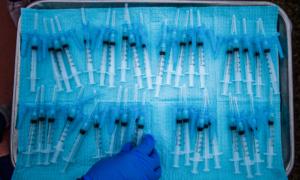People who received a COVID-19 vaccine had higher levels of a glucose analogue than unvaccinated people, suggesting heart inflammation, according to a new study.
Researchers in Japan compared 700 vaccinated people with 303 unvaccinated people. None experienced cardiac symptoms.
Researchers analyzed results from positron emission tomography and computerized tomography (PET/CT) scans that analyzed the uptake of fluorodeoxyglucose F18 (FDG), a glucose analogue and marker of inflammation, in the body.
Researchers found that people vaccinated with a Moderna or Pfizer vaccine had higher levels of FDG in the heart, liver, and spleen than unvaccinated people.
The higher levels of heart FDG remained when stratifying the patients by various factors, such as age, except for people who were tested more than 180 days after vaccination.
“Even though vaccinated patients in this study showed elevated myocardial FDG uptake on PET/CT up to 180 days after vaccination, this could result from relatively minor inflammation and may not represent severe myocardial abnormalities,” they said.
Moderna and Pfizer didn’t respond to requests for comment.
Editorial
In an editorial also published by Radiology, Dr. David Bluemke said the results of the study were compelling. He noted that researchers examined some potential confounders and the results held up. However, researchers didn’t test heart function.“Unfortunately, no myocardial enzyme analysis was available, and cardiac function was not available. In addition, the authors did not scrutinize the oncologic histories and treatments of their patient groups,” wrote Dr. Bluemke, professor of radiology at the University of Wisconsin School of Medicine and Public Health and editor emeritus of the journal.
He also noted that retrospective studies are more prone to bias, with unknown factors, including why some patients receive a vaccine and some don’t.
“The results are intriguing but unfortunately incomplete,” Dr. Bluemke said.
None of the patients analyzed in the study reported chest pain, although some reported noncardiac symptoms such as fever and a sore arm.
Others Weigh In
Dr. Sanjay Verma, an American cardiologist who wasn’t involved in the research, told The Epoch Times in an email that the increased FDG in vaccinated patients tested before and after receiving a vaccine “does suggest that vaccination rather than underlying inflammation alone is playing a causal role in the increased FDG uptake after vaccination.”He said the study adds to other research and his own experience with patients, showing the need for doctors to understand that heart problems after COVID-19 vaccination can result in symptoms other than chest pain, including fatigue and shortness of breath.
“It is imperative that medical professionals broaden their scope of what symptoms they identify as potentially related to heart damage after COVID-19 vaccination,” Dr. Verma said.
Early detection means earlier treatment, which can lead to quicker recovery, according to the doctor.
Both Dr. Verma and Dr. Andrew Bostom, a U.S. heart expert who also reviewed the paper, said the findings were preliminary because there were no signs that the FDG levels resulted in health issues.
“If the investigators can show the PET findings predict hospitalizations for heart failure or cardiac arrhythmias or sudden cardiac death, upon prospective follow-up, that would [be] much more interesting,” Dr. Bostom told The Epoch Times via email.
Retrospective studies examine medical records, while prospective studies track patients for a period of time.
The study went over scans performed in adult patients between November 2020 and March 2022. The population before exclusions was about 9,400. Researchers excluded many of the patients, including patients who received more than two doses of a vaccine, patients with a history of COVID-19, and patients who underwent cardiac surgery.
Dr. Nakahara didn’t respond to a request for comment.
The researchers said one limitation of the study is that it was retrospective.
“A prospective study would be needed to validate the findings of this study including comparisons with cardiac enzyme, cardiac functions and non-mRNA vaccination,” they wrote.
The Pfizer and Moderna vaccines use mRNA technology.
FDG Testing
The FDG testing has, for years, been used to detect cardiac sarcoidosis, an inflammatory heart disease. It has increasingly been used to detect myocarditis and a related condition, pericarditis, in lieu of or with cardiac MRIs.The testing involves injecting a tracer, or a drug, and imaging with the PET scan to measure levels of fluorodeoxyglucose. CT scans are sometimes done to supplement the PET scans.






